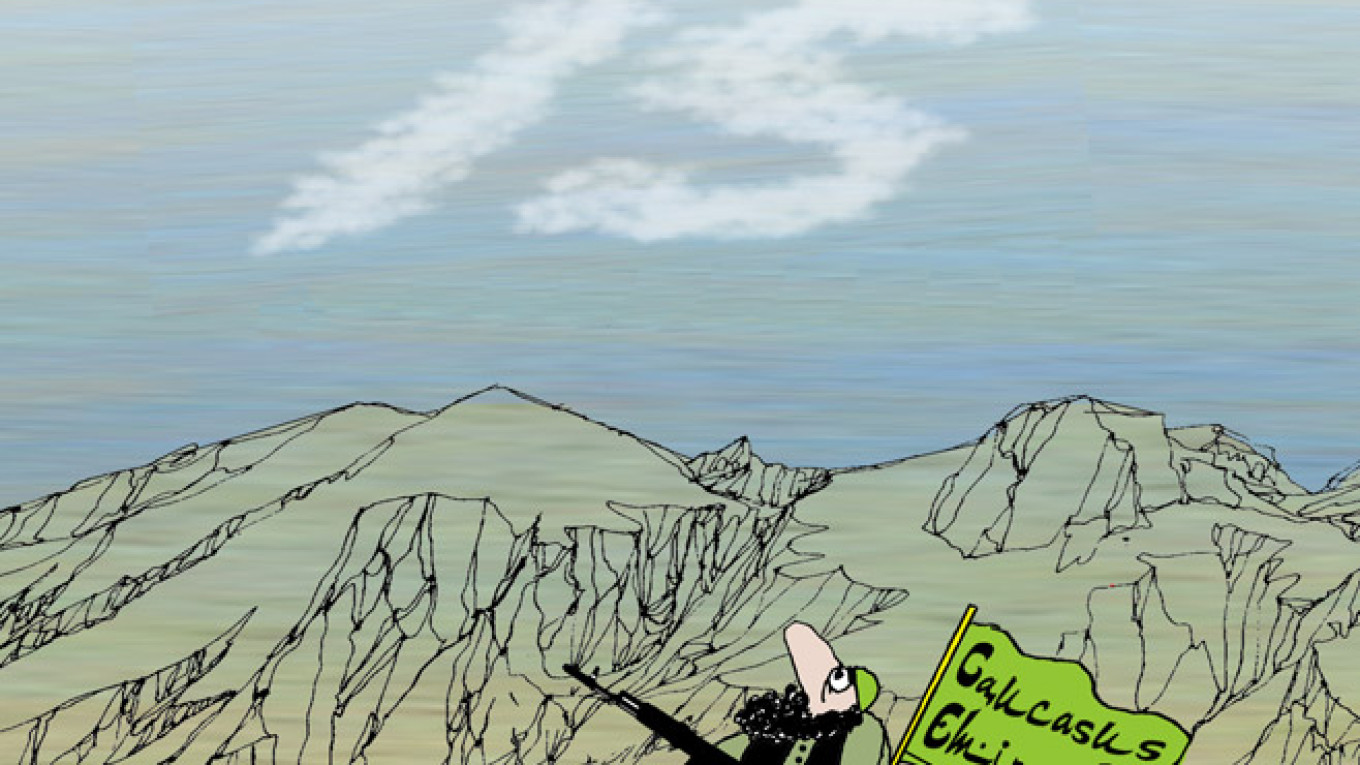Six North Caucasus terrorist field commanders have renounced their membership in the notorious Caucasus Emirate organization and over recent weeks instead pledged their loyalty to the Islamic State. This means very little in practical terms, but it says a great deal about the dysfunctions of the insurgency and the way that the terrorist threat to Russia is in decline.
It has long been questionable just how much real authority rested in the so-called "Emirate," proclaimed by former Chechen rebel commander Doku Umarov and now headed by Aliaskhab Kebekov — also known as Sheikh Ali Abu-Muhammad — following Umarov's death in 2013. In practice the jamaats, or rebel movements, in each of the North Caucasus republics seem to be pretty autonomous, and even within them individual group heads often do their own thing.
Kebekov, for example, has been trying to move the rebels away from their existing campaign of small-scale violent attacks on police officers, judges, officials and pro-government clerics, and toward a political campaign to win wider support.
He is no moderate and has shown no qualms about the use of violence, but he has realized that even if many within the North Caucasus are unhappy about Russian rule and the corrupt and inefficient local regimes through which Moscow works, that does not necessarily mean they have any sympathy for murderous terrorists, either.
According to Federal Security Service director Alexander Bortnikov, the number of terrorist crimes reported in 2014 was just 78, some three times fewer than in 2013. Admittedly this figure needs to be taken with caution because it excludes the near-daily small-scale local attacks in the North Caucasus. According to the Dagestani branch of the Interior Ministry, for example, last year saw 103 attacks on police and security officers within that republic alone, but there was a genuine decline in the terrorist threat to Russia.
This cannot in any way be ascribed to Kebekov's efforts, though, not least as he sanctioned December's showy if militarily futile attack on Grozny on the eve of President Vladimir Putin's state-of-the-nation address. Instead, it reflects a combination of more effective security measures and the outflow of especially extreme militants to Syria and Iraq to join the Islamic State, which the Russian Supreme Court formally labeled a terrorist movement in late 2014.
Of the six defectors from the Caucasus Emirate, three are Chechen and three Dagestani, including Rustam Aselderov, head of the Dagestani jamaat. In practice, though, their defection means very little. Unlike al-Qaida — the previous fashionable jihadist "brand" — the Islamic State has shown itself less interested in encouraging terrorism worldwide and instead seeks supporters to fight in Iraq and Syria for the moment.
Unless these commanders intend to trek south to join the Islamic State war effort, which seems rather unlikely, their defection actually is simply a repudiation of Kebekov's already-limited authority.
Ironically, both Kebekov and his close allies and elements of the Russian security apparatus have had a common stake in presenting the Caucasus Emirate as a single, disciplined terrorist movement.
However, it is clearly nothing of the sort: It speaks volumes that Kebekov has largely confined himself to complaining about Aselderov's "betrayal" and that he did not come and discuss his proposed defection before announcing it. Kebekov clearly has no real teeth.
It is certainly the case that some young militants are crossing the border to join the Islamic State, even though most of the Chechens reported within its ranks are actually ethnic Chechen Syrians. There may well be a price to be paid when and if they return home with the experience — and perhaps allies — they gained in Iraq and Syria.
But Moscow hopes that many never will return and that the perverse pragmatic battlefield alliance of Syrian, U.S., Iraqi, Kurdish and Iranian forces will winnow their ranks significantly.
The "rebel rebels" such as Aselderov will not give up their fight, but nor are they going to receive any assistance from abroad thanks to their new affiliation. Instead, this flirtation with the Islamic State reflects exasperation with Kebekov, a desire to associate with the popular new kid on the jihadist block, and a degree of desperation. While life for most in the North Caucasus is not getting better, this does not seem to be leading to the kind of mass radicalization the insurgents had anticipated.
Kebekov wants more outreach, but seems not to know how to accomplish it. The more radical commanders think that more violence is the answer. One of the defectors, Abu-Mukhammad Agachaulsky, famously threatened Dagestani officials that they would "kill you, together with your relatives, neighbors, and all those loyal to you."
Either way, although the wider social, economic and political conditions in the North Caucasus are not improving, and despair and resentment continue to bedevil the region, so far at least the terrorists are not the beneficiaries.
Mark Galeotti is professor of global affairs at New York University.
A Message from The Moscow Times:
Dear readers,
We are facing unprecedented challenges. Russia's Prosecutor General's Office has designated The Moscow Times as an "undesirable" organization, criminalizing our work and putting our staff at risk of prosecution. This follows our earlier unjust labeling as a "foreign agent."
These actions are direct attempts to silence independent journalism in Russia. The authorities claim our work "discredits the decisions of the Russian leadership." We see things differently: we strive to provide accurate, unbiased reporting on Russia.
We, the journalists of The Moscow Times, refuse to be silenced. But to continue our work, we need your help.
Your support, no matter how small, makes a world of difference. If you can, please support us monthly starting from just $2. It's quick to set up, and every contribution makes a significant impact.
By supporting The Moscow Times, you're defending open, independent journalism in the face of repression. Thank you for standing with us.
Remind me later.


